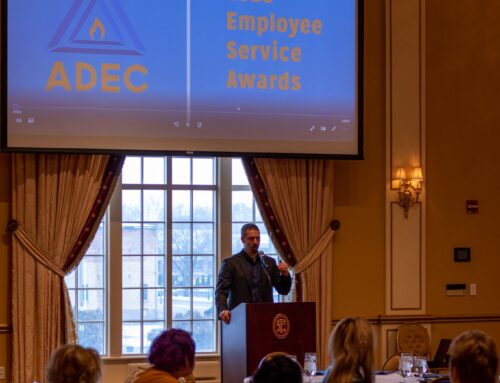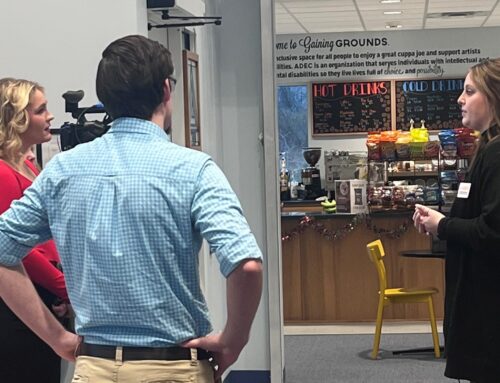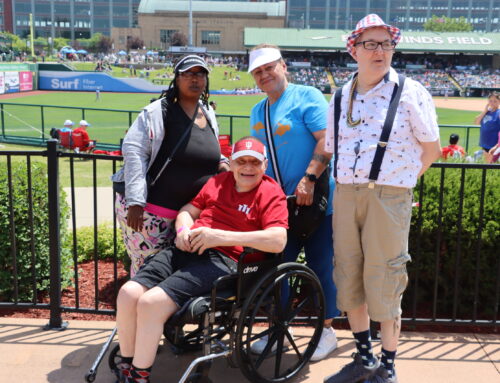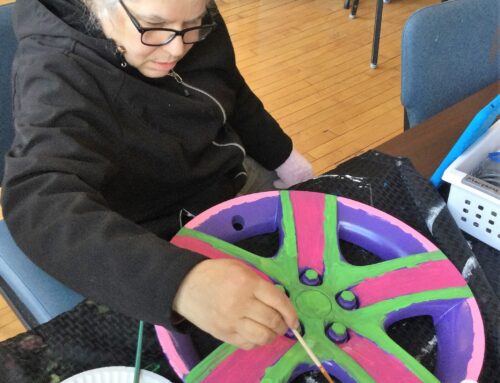As members of the Mission Advancement Team, we like to get out of the office as much as possible to witness the amazing things happening every day at ADEC so we can spread the word to the community. Although we see how hard our direct support professionals work to provide choice and possibility to people with disabilities, we haven’t always realized what all it takes to be a DSP – until now.
To recognize Direct Support Professional Recognition Week, which runs Sept. 11-17, we each spent two hours working as a DSP in various locations. We went through all the training – yes, we somehow all managed to pass Core A and Core B – and showed up at our assignments like a new hire would.
Rod Tackett spent his time in a supported living duplex, Whitney Craig worked at Day Service at Mishawaka and Michelle Sokol spent an evening in the Village Women North Group Home.
After finishing our shifts, we spent some time talking about what we learned from the experience and discussing how much we respect the hundreds of DSPs who clock in each day to support ADEC’s mission.
What surprised you most about your DSP experience?
Rod: I don’t know if anything surprised me, necessarily, just because of stories that I’ve heard. I think seeing some of it was different, especially having to go through Core A and Core B and just how thorough you have to be with passing medications. During training, you are passing meds for Adam ADEC. But in reality, you go in and there are four clients that need medications every morning and every evening, and that can be a little bit overwhelming – especially when you’re looking at the charts and realize some clients need 12 medications. It’s a really important thing, but that’s just one of the aspects of it all. They’re passing meds, but they’re also preparing dinner and they’re trying to get clients to change their clothes and make their beds and do their laundry and all of these other things all at once.
Michelle: It was surprising to sit through all the training and see how much responsibility we put on these DSPs the second they walk in the door. But then, when they first enter that day service or that group home, there’s even more expected of them than what the training covers. They’re just thrown into it, and they rock it, really. They make it happen for our clients.
Whitney: What struck me the most was being in day service during vocation time and seeing one of the staff simultaneously planning a craft while providing other care. She’s sitting at the table trying to instruct people on how to complete this painting activity, gluing the popsicle sticks together while talking to everyone about their weekend and their lives. Then a client comes in who needs some direct care, and she’s going and working with that client, redirecting his attention and distracting him. While she’s doing it, she’s still talking to all her other clients, keeping up the conversation, continuing the craft they’re working on. She’s not letting that painting project slide. She’s just multiplying the amount of work she’s doing. It made me think, how many balls can you have up in the air at one time. I don’t know how she can hold all of that in her head at one time.
Michelle: I saw that happen in the group home, too. Getting dinner ready, getting ready to get over to bingo night, helping a client through physical therapy activities, finishing up the cleaning and chores that happen every night, making sure the ladies are comfortable while watching TV before dinner. The multitasking is incredible.
Whitney: It was just so interesting watching all the different responsibilities that had to be going on simultaneously. And how personally in-tune you have to be with each person you’re serving.
Michelle: What also surprised me was the compassion that went into it. When you’re going through the training and when you’re hearing about the work that our DSPs do, it can feel so clinical sometimes. But when you’re actually in the home and seeing it, they make sure it’s not that way. It’s a home, they are like family there. It’s still very professional, but when they’re going through physical therapy, they are talking and asking questions — How are you feeling? What’s bothering you? What’s going on in your life? — but they are still providing the medical care that’s needed. That was cool to see.
Rod: That was one of the things I was thinking about when my experience was done. Ultimately, I’m thinking of my mom and I’m thinking of my dad and everything they’re doing. There’s this element that if a client doesn’t want to listen, it’s not like DSPs can say, “Go to your room and think about it.” We’re dealing with adults who have choice and possibility, and some of that choice is to say, “No, I’m not going to do this and to have the patience to continue to deal with that day after day is incredible.
Whitney: The patience and compassion that this job takes is really amazing. Being able to put yourself in someone else’s shoes enough to not be angry or frustrated when things don’t go your way. Instead to just going, “OK, let’s do it this way.”
What was your favorite part of your DSP experience?
Rod: Bingo was fun. The cool thing, not necessarily the fun thing, but Erwin has this desire to go back to school and relearn some different stuff. So his staff had been working with him at the duplex and just kind of going through the alphabet. He has an attendance sheet that he marks every day that he’s done schooling for that day, so he’s just practicing his alphabet right now. I’m watching him write down ABCs and seeing the shaky letters, but just seeing that sense of pride in him. It’s one of those personal touches in the midst of going through these different tasks that they care enough to do that. The staff isn’t just saying, “Well, figure it out.”
Michelle: One of my favorite things was talking with the house manager about the Halloween party they do every year at Village Women’s. She showed me the Halloween decorations, but then she started showing me the pictures from past years. When the clients found out she was talking about it, some of them wanted to show me their own pictures. They were just so proud of this tradition that this home has, and it’s something special there that they can all take part in.
Whitney: I enjoyed sitting and having lunch with Frank, who I had never talked to much before. It started off as a light conversation and in the end we started talking about some of his history. We talked about his housemates — I called them roommates at first, but he corrected me because he has his own room — and we talked about the staff and how they make it so he can live as independently as possible. He said something during that conversation about how he is an adult and he has the right to make his own choices, that no one else can take that from him. Hearing that from one of our clients was so empowering. He understands that he is in a place right now where he can make his own choices, and he sees that possibility. That really struck me.
But on the other hand, our DSPs deal with the unexpected every day, and the catastrophic sometimes. And they take it in hand and still provide amazing service to our clients. Most of us would throw our hands up and be like, “I’m done.”
Michelle: That’s what I’m trying to remember, is we were just in there for two hours. When I was there, everyone as commenting about what a quiet, calm night it was there. Sometimes it’s not all fun banter and good times. There are a lot of tough things that our DSPs take in stride and it’s important to remember that, too.
Whitney: It’s amazing how resilient our staff is. There was a bathroom incident that day and a behavior incident at another day program site I visited, but the staff made sure our clients were taken care of. And they reassure our clients that even if there’s an issue, our clients are safe and they are going to be taken care of. Our staff is that constant. A lot of life can seem unstable, but to many of our clients, our DSPs are a constant source of affirmation and support. That doesn’t change, no matter what happens.
Are you glad you had the DSP experience?
Whitney: It helps me understand a little more. I know I didn’t fully step into those shoes. It would be ignorant of me to say, “Oh, I get it.” But it helps me to at least begin to understand the work that our staff have to do each day to make ADEC the amazing place it is. I don’t think I realized just how much I was taking for granted that happens on a daily basis.
Rod: it makes me appreciate the folks that stick around. When you hear that someone has been here for 25 years, 30 years, that they’ve been doing this for that long. I have an extreme amount of respect for them. It’s a tough job and to be that tenacious and to love your job that much is pretty cool.
Michelle: I’m really happy that I had the experience, especially being so new here. It really helped me understand what we do at ADEC better — although two hours is not enough to understand fully. It also made me realize it’s a job that takes a while to get started and find your footing, but once you do you can make an amazing difference in the lives of the people we serve.
How would you describe a DSP in one word?
Whitney: Responsible.
Michelle: Resilient.
Rod: Sacrificial.
Throughout DSP Week, we will also be recognizing some ADEC employees who go above and beyond. Check out the highlights on ADEC’s Facebook page or look for Friday’s edition of The Open Door newsletter.











